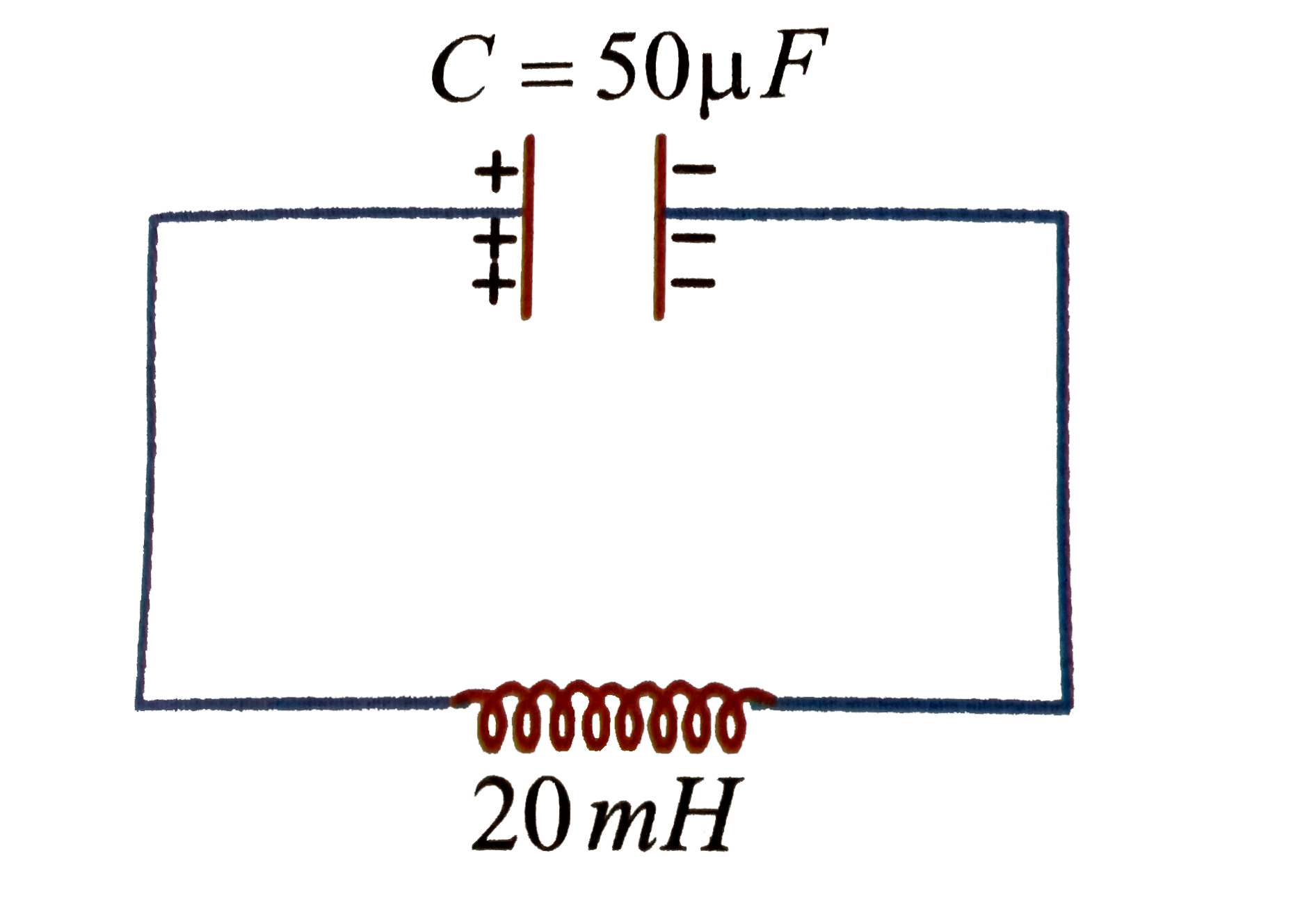An LC circuit contains a 20 mH inductor and a capacitor with an initial charge of 10 mC. The resistance of the circuit is negligible. Let the instant the circuit is closed be t = 0.
(a) What is the total energy stored initially ? Is it conserved during the oscillations?
(b) What is the natural frequency of the circuit?
(c ) At what time is the energy stored? (i) Completely electrical ? (ii) Completely magnetic ?
(d) At what time is the total energy shared equally between the inductor and the capacitor ?
(e) If a resistor is inserted in the circuit, how much energy is eventually dissipated as heat ?
Inductance of the induc tor,
Capacitance of the capacitor,
Initial charge on the capacitor ,
(a) Total energy stored initially in the circuit is given as:
Hence , the toal energy stored in the LC circuit will be conserved because there is no resistor connected in the circuit.
(b) Natural frequency of the circuit is giv en by the relation,
Natural angular frequency,
rad/s
Hence, the natural frequecy of the circuit is rad/s.
Topper's Solved these Questions
Similar Questions
An LC circuit contains a 20 mH inductor and a 50 uF capacitor with an initial charge of 10 mC. The resistance of the circuit is negligible. Let the instant, the circuit is closed be t = 0.
(a) What is the total energy stored initially ? Is it conserved during LC oscillations ?
(b) What is the natural frequency of the circuit ?
(c) At what time is the energy stored
(i) completely electrical (i.e., stored in the capacitor)?
(ii) completely magnetic (i.e., stored in the inductor)?
(d) At what times is the total energy shared equally between the inductor and the capacitor ?
(e) If a resistor is inserted in the circuit, how much energy is eventually dissipated as heat ?
View SolutionAn L–C circuit contains inductor of inductance L and capacitor of capacitance C with an initial charge q0. The resistance of the circuit is negligible. Let the instant the circuit is closed be t = 0.
(i) What is the total energy stored initially?
View Solution
Knowledge Check
An LC circuit contains a 20mH inductor asn a 50μF capacitor with initial change of 10mC. The resistance of the circuit is negligible. Let the instant the circuit is closed be t=0.
 AEnergy stored in the circuit in completely electrical at t=nπ2000BEnergy stored in the circuitin completely magnetic at t=(2n+1)π2000CEnergy stored in the circuit in shared equally between the inductor and capacitor at t=(2n+1)π4000DEnergy stored in the circuit is shared euqally between the inductor and capacitor at t=nπ2000
AEnergy stored in the circuit in completely electrical at t=nπ2000BEnergy stored in the circuitin completely magnetic at t=(2n+1)π2000CEnergy stored in the circuit in shared equally between the inductor and capacitor at t=(2n+1)π4000DEnergy stored in the circuit is shared euqally between the inductor and capacitor at t=nπ2000An LC circuit contains a 20 mH inductor and a 50μF capacitor with an initial charge of 10 mC. The resistance of the circuit is negligible. Let the instant at which the circuit which is closed be t=0. At what time the energy stored is completely magnetic ?
At = 0Bt=1.54msCt=3.14msDt=6.28msAn LC circuit contains a 20 mH inductor and 25μF capacitor with an initial charge of 5 mC. The total energy stored in the circuit initially is
A5 JB0.5JC50 JD500 J
An L-C circuit contains 20 mH inductor and a 50μF capacitor with an initial charge of 10 mC. The resistance of the circuit is negligible. Let the instant the circuit is closed be t = 0. what is the total energy stored initially ? At what times is the total energy shared equally between the inductor and the capacitor ?
View SolutionWhat is the energy stored in a pure LC circuit ?
View SolutionA circuit containing an 80 mH inductor and a 250μF capacitor in series is connected to 240 V, 100rad/s supply. The resistance of the circuit is negligible. (i) Obtain rms value of current. (ii) What is the total average power consumed in the circuit ?
View SolutionAn LC circuit contains a 20mH inductor and a 50μF capacitor with an initial charge of 10mC. The resistance of the circuit be closed at t=0. The time when the total energy shared equally between the inductor and the capacitor is, approximately.
View SolutionAn Lc circuit contains a 40 mH inductor and a 25μF capacitor. The resistance of the circuit is negligible.The time is measured from the instant the circuit is closed. The energy stored in the circuit is completely magnetic at time (in milliseconds)
View Solution
